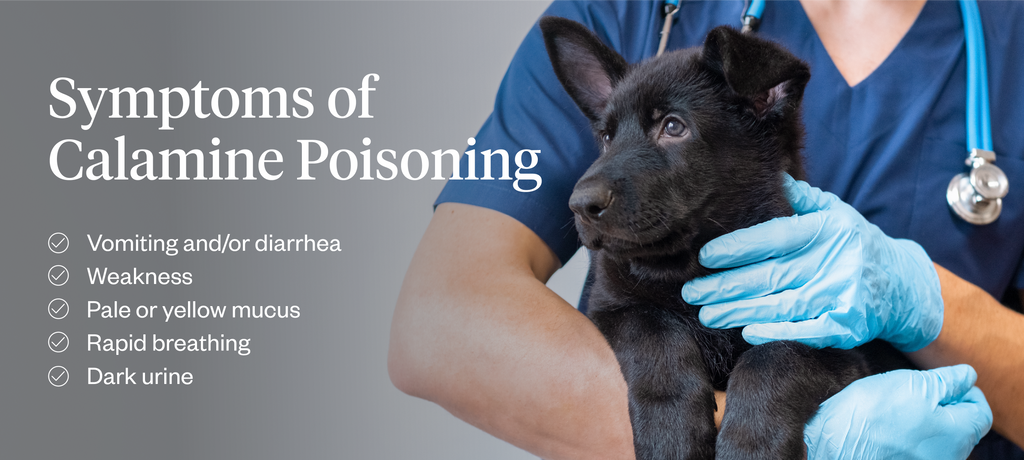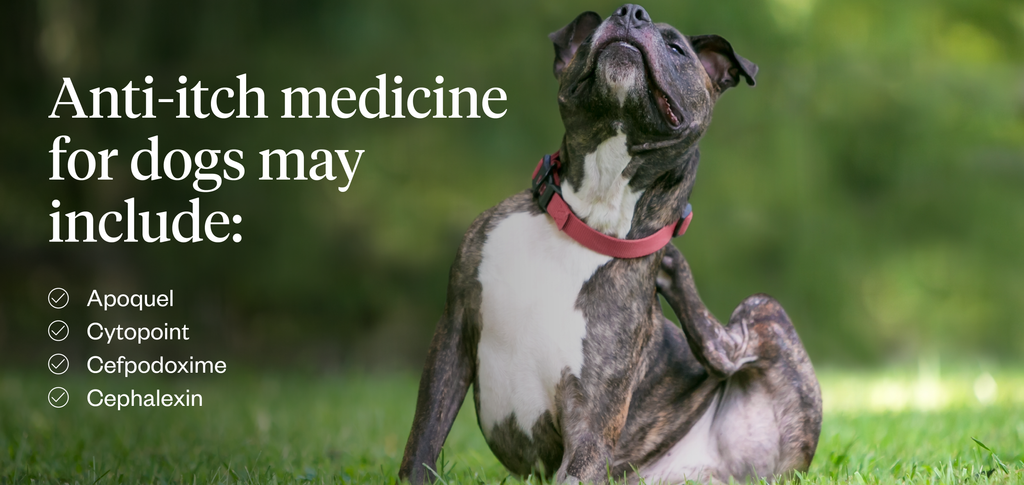6 Min Read
Can You Put Calamine Lotion on Dogs?
Key takeaway

Why pet owners are switching to online vet care with Dutch
-
Prescriptions delivered free to you
-
Fast access to Licensed Vets over video
-
Unlimited video visits and follow-ups
Is calamine lotion safe to relieve your dog’s itchy skin? No. Sometimes, dogs can get itchy skin, just like we do. However, while we might instantly reach for this common anti-itch remedy, it’s not the best option for our furry friends. In fact, vets recommend keeping calamine lotion far away from your dog, because it contains certain ingredients that can be harmful to them.¹
Generally, pet-safe products are the best way to go, but if in doubt, always ask your vet. In this post, we’ll take you through why calamine lotion is unsafe for dogs and which anti-itch products you can give your pooch instead.
- Why is Calamine Lotion Dangerous to Dogs?
- How to Treat Your Dog’s Itchy Skin
- Itching Medicine for Dogs
- FAQs
- Final Notes
Why is Calamine Lotion Dangerous to Dogs?
The main ingredient in calamine lotion is zinc oxide. If a dog ingests too much of this chemical, it can lead to zinc toxicity, which can cause damage to their intestines. It’s a serious condition that can be fatal without medical intervention.¹

Symptoms include:
- Vomiting and/or diarrhea (signs of damage to the intestines)
- Weakness (often caused by anemia as a result of the illness)
- Pale or yellow mucus
- Rapid breathing
- Dark urine
Seek emergency veterinary care immediately if you think your dog might be suffering from zinc toxicity.²
Dogs lick their sores as a way to self-soothe, which increases the risk of them ingesting whatever substance might be on their skin.
Additionally, if you apply calamine lotion to your own skin, make sure your pup doesn’t lick it off you when giving you kisses. However, even if they don’t ingest it, calamine lotion can still cause skin irritation for your dog, so it’s better to stick with animal-friendly remedies.¹
How to Treat Your Dog’s Itchy Skin
Dogs scratch themselves for a number of reasons and more often than not, it’s not any cause for concern. The occasional itch behind the ear is normal and even slightly more itching after playing in the garden is usually fine. However, excessive itching or licking at skin can indicate something more serious. Luckily, your dog’s itchy skin can often be solved with topical ointments, creams, or oral medication.³
The first step is to figure out what is causing your pup’s itching. In order to provide your vet with the most detailed information, try and observe where your dog is scratching themselves. How hard are they scratching? Are they showing other signs of discomfort, like whimpering, fatigue, or irritability? Is their skin matted, oozing, or bleeding?³
The more information you are able to gather, the easier it will be to narrow down the underlying cause. This can help your vet make a quicker, more accurate diagnosis. For example: Fleas or a bug bite will likely require a different remedy than itchiness caused by allergies. Issues such as bacterial infections may also cause itchy skin, but require antibiotics to treat effectively.³

Itching Medicine for Dogs
While calamine lotion isn’t a good choice for your canine pal, there are several animal-friendly ones available. Some of the most common canine anti-itch medications are Apoquel, Cytopoint, cefpodoxime, and cephalexin. The latter two medications are actually antibiotics that treat a large variety of underlying infections.⁴ Keep reading to find out more about each of these options.
Apoquel
Apoquel is a fast-acting itch relief medication. It’s often highly effective, although this can vary depending on the root cause of your dog’s itchiness. In most cases, it will at least provide your dog with some form of relief.
Like most animal medications, Apoquel is prescribed as an oral tablet, which is often easier for dogs to handle and eliminates the risk of them licking ointment off the affected area. This medication starts working within 4 hours and wears off after approximately 24 hours.⁶ Your vet may prescribe Appoquel if your dog is experiencing⁶:
- Frequent scratching, licking, biting, or chewing
- Excessive rolling, rubbing, or scooting
- Head shaking, ear discharge, or scratching at ears
- Hair loss
- Rash, redness, greasy skin, or scabs
Cytopoint
Cytopoint is an injectable allergy medication that must be administered by your veterinarian. Cytopoint begins working within 24 hours to relieve itching and provides relief for 4-8 weeks.
Cefpodoxime
Cefpodoxime is a prescription antibiotic for dogs that can help relieve itching from bacterial skin infections or wounds. Some vets also prescribe it to treat respiratory or bladder infections. This uncoated tablet is easy for dogs to swallow and blends in well with your dog’s food or treats.⁷
Cephalexin
If your dog’s itchy skin is due to more general bacterial infections, then a vet might choose to prescribe Cephalexin. This broad-spectrum antibiotic targets issues like⁸:
- Bacterial skin infections (such as superficial pyoderma)
- Urinary tract infections
- Ear infections
- Respiratory infections
These types of infections can cause itchy skin, but still need to be properly treated with antibiotics. Cephalexin comes in liquid form and should be mixed with water before administering to your dog. Mild side effects can occur, but are rare.⁸
FAQs
What human lotion can I use on my dog?
A good rule of thumb is to avoid using human lotions on your dog. While some products might be ok for dogs, it’s always better to use 100% animal-friendly lotions. When in doubt, ask your vet.
What happens if my dog gets into calamine lotion?
Calamine lotion contains zinc oxide, which is very harmful to dogs. Seek veterinary care if your dog has ingested calamine lotion, especially if they have sudden vomiting or diarrhea. You can also contact emergency vet or animal poison control at (888) 426-4435.⁹
How can I help my dog’s skin rash?
At Dutch, we understand that our furry friends also experience itchy skin from time to time. Certain bacterial infections can also cause itching or irritation of the skin. There are several anti-itch medications available for dogs. Read about the most common ones here or schedule an online consultation with a licensed veterinarian when you activate your Dutch membership.

Final Notes
Calamine lotion is unsafe for dogs. Nevertheless, there are medications that can provide effective itch relief for your pup. Various ailments can cause itchy skin, including fleas, parasites, bacterial infections, or just general dryness.
Dutch provides you with reliable veterinary advice from the comfort of your home. Speak with one of our many qualified vets about which type of itch relief medication your dog needs. Find out more about our services at Dutch.com and get peace of mind for your pet today.
Share
References
-
Oxenhandler, Yaniv. “Can You Use Calamine Lotion on Dogs? Is It Safe?” Petfluence, 27 Oct. 2023, https://petfluence.co/blog/post/calamine-lotion-on-dogs.
-
Travis, Helen Anne. “Dangers of Topical Medication for Pets.” PetMD, Chewy, 4 May 2017, www.petmd.com/dog/emergency/poisoning-toxicity/dangers-topical-medication-pets.
-
“The Best Itch Relief for Dogs.” Edited by Brian Evans, Dutch, Dutch Pet Inc., 19 Oct. 2021, www.dutch.com/blogs/dogs/itch-relief-for-dogs#causes.
-
“Cephalexin.” Plumb’s Veterinary Medication Guides, 2020. https://www.seattle.gov/documents/Departments/AnimalShelter/Cephalexin%20Info%20Sheet.pdf
-
Zoetis Editorial. “Ditch Seasonal Itch with Apoquel.” Ditch the Itch, Zoetis New Zealand Limited, 2017, www.ditchtheitch.co.nz/itch-solutions-apoquel.html.
-
Dutch Editorial. “Apoquel (RX).” Dutch, Dutch Pet Inc. www.dutch.com/products/apoquel?collection=itching-medicine-for-dogs. Accessed 18 Jan. 2024.
-
Dutch Editorial. “Cefpodoxime (RX)” Dutch, Dutch Pet Inc. www.dutch.com/products/apoquel?collection=itching-medicine-for-dogs. Accessed 18 Jan. 2024.
-
Dutch Editorial. “Cephalexin (Rx)” Dutch, Dutch Pet Inc. www.dutch.com/products/apoquel?collection=itching-medicine-for-dogs. Accessed 18 Jan. 2024.
-
“Animal Poison Control.” American Society for the Prevention of Cruelty to Animals (ASPCA), www.aspca.org/pet-care/animal-poison-control. Accessed 18 Jan. 2024.



